Counseling > QUESTIONS & ANSWERS > National Counselor Examination Study Guide, Questions and answers, 100% accurate, Approved. Rated (All)
National Counselor Examination Study Guide, Questions and answers, 100% accurate, Approved. Rated A+
Document Content and Description Below
National Counselor Examination Study Guide, Questions and answers, 100% accurate, Approved. Rated A+ Using motivation from 'within' is known as ______________ A. Inside motivation B. Interior m... otivation C. Intrinsic motivation D. Idealistic motivation - ✔✔-C. Intrinsic motivation Which of the following is not an example of extrinsic motivation? A. Employee performance improves when wages are increased B. A sleep apnea patient follows a strict sleep hygiene plan C. Children finish a task more quickly if they are promised candy D. A student studies more on a test to make the highest grade in the class - ✔✔-B. A sleep apnea patient follows a strict sleep hygiene plan Which of the following socioeconomic factor could affect the outcome of therapeutic counseling? Choose all that apply. A. Lack of transportation B. Lack of intrinsic motivation C. Lack of positive cultural norms for entering therapy D. None of the above - ✔✔-A. Lack of transportation C. Lack of positive cultural norms for entering therapy What is the meaning of transference/countertransference relationships? Choose all that apply. A. A client transferring their relationship with another onto the therapist B. The therapist transferring their relationship with another onto the client C. Transferring the blame or outcome of behavior onto someone else D. None of the above - ✔✔-A. A client transferring their relationship with another onto the therapist B. The therapist transferring their relationship with another onto the client What is one instance that might cause a clinician to break the strong code of client confidentiality? A. Feeling the need to talk B. Duty to warn C. When the therapist is going on vacation D. All of the above - ✔✔-B. Duty to warn Behavior Theory - ✔✔-comes from the idea that all behaviors are learned and acquired through a process known as conditioning What theory is most often associated with the psychologists B.F. Skinner and John B. Watson? - ✔✔- behavior theory Behavior Therapy - ✔✔-concentrates on the observable behaviors of a person or group, and dismisses internal mental states Key components of Behavior theory: - ✔✔-conditioning, reinforcement, and punishment What does behavioral theory NOT take into count? - ✔✔-the concepts of emotion or even the unconscious or subconscious, as these states are subjective rather than objective Behaviorists believe that all behavior can be what? - ✔✔-Trained Classical Conditioning - ✔✔-a process in which a subject comes to respond to a stimulus that was previously considered neutral, continued exposure to the stimulus will elicit a desired response Operant Conditioning - ✔✔-a process in which a subject engages in the correct behavior through the use of both rewards and punishments for a response. The subject learns to associate the behavior with the outcome Who created the behavioral psychology theory based on the idea that human beings respond to their environment; external stimuli, not internal stimuli? - ✔✔-Watson - he believed that all human beings could change their behavior through classical or operant conditioning. Who developed the following schedules of reinforcement: Continuous reinforcement, partial reinforcement (fixed ratio, variable ratio, fixed interval, variable interval) - ✔✔-B.F. Skinner - behavioral theorist Continuous reinforcement schedule - ✔✔-reinforcing the desired response every time it occurs Partial reinforcement schedule - ✔✔-reinforcing a response only part of the time; results in slower acquisition of a response but much greater resistance to extinction than does continuous reinforcement fixed ratio schedule - ✔✔-a reinforcement schedule that reinforces a response only after a predetermined number of responses What strength of reinforcement does fixed ratio schedule produce? - ✔✔-a high, steady rate of responses. What schedule of reinforcement is: giving a subject a piece of candy after they answer five questions correctly - ✔✔-Fixed ratio variable-ratio schedule - ✔✔-a reinforcement schedule that reinforces a response after an unpredictable number of responses What strength of reinforcement does variable-ratio schedule produce? - ✔✔-High, steady rate of responding What schedule of reinforcement is: a slot machine - ✔✔-variable-ratio fixed-interval schedule - ✔✔-a reinforcement schedule that reinforces a response only after a specified time has elapsed What schedule of reinforcement is: a subject being rewarded after two minutes of activity and then after each two minutes of activity? - ✔✔-fixed-interval variable-interval schedule - ✔✔-a reinforcement schedule that reinforces a response at unpredictable time intervals What schedule of reinforcement is: rewarding a subject after one minute of activity, three minutes of activity, six minutes of activity, and so on... - ✔✔-variable-interval In operant conditioning, reinforcement ______________ behavior and punishment _______________ behavior. - ✔✔-Increases, Decreases What is the difference between positive and negative reinforcement? - ✔✔-Positive reinforcement adds a stimulus, negative reinforcement either removes a noxious stimuli (buckling seatbelt to get rid of beeping) or behavior avoids noxious stimulus (studying to avoid bad grades) A counselor asks her client what day it is, where he is right now, and what his name is. The counselor is gathering info for what part of the mental status examination? - ✔✔-Sensorium What characterizes Generation "X" group, which refers to individuals born between 1965 and 1976? - ✔✔-Wanting exciting jobs and keeping options open A married couple with two school-aged children gets divorced, which drastically reduces the amount of conflict in the home. All of a sudden, however, the younger child starts throwing temper tantrums, whereas before he was perfectly well-behaved. What phenomenon might explain this child's change in behavior following the divorce? - ✔✔-Homeostasis What are the four stages of Bergan's behavioral model of consultation? - ✔✔-Problem identification, problem analysis, plan implementation, problem evaluation Delirium, Parkinson's disease, and Alzheimer's disease are all what type of disorder? - ✔✔- Neurocognitive A family counselor who consciously joins with the family during sessions, observes what he experiences during those sessions, and then makes interpretations to family members is most likely operating from what perspective? A. Bowen B. Humanistic C. Experiential D. Narrative - ✔✔-C. Experiential A counselor works closely with clients from a culture different from hers in an attempt to understand their perspectives - is an example of what type of worldview? - ✔✔-Emic Facts about social justice counseling: - ✔✔-- it seeks a balance of power and resources - it addresses issues of unequal power - it has led to ACA identifying advocacy competencies for counselors what is shaping in operant conditioning? - ✔✔-a way of adding behaviors to a persons repertoire -used when target behavior does not yet exist -what is reinforced is an approximation of the target behavior, the behavior you want to shape. Thorndike is best known for what theory? - ✔✔-law of effect - responses that are immediately positively reinforced are more likely to occur again in the future. -also, responses that are immediately negatively reinforced are are less likely to occur in the future. Cognitive theories of psychology focus on what? - ✔✔-a persons thought processes, such as motivation, problem solving, decision-making, thinking, and attention. Aaron Beck is what kind of theorist?? - ✔✔-Cognitive -believed people had automatic thoughts which are spontaneous negative cognitive distortions. -negative thoughts affect a persons behavior. -regardless of disorder a person is experiencing - he believed if negative thoughts could be identified, they could be evaluated and replaced - which would then change the response or behavior Filtering, Polarized thinking, Overgeneralization, Catastrophizing, Personalization, Control Fallacies, Blaming, Shoulds, Emotional Reasoning, and Always being right - are examples of what? - ✔✔-Cognitive Distortions Filtering - ✔✔-negative details of a situation are magnified and all positive details of the situation are deleted. The person then dwells on the negative of the situation. Polarized thinking - ✔✔-Situations, People or places are either "all or nothing". For example, a person either loves or hates others, or perceives situations as "the best ever" or "the worst ever" Overgeneralization - ✔✔-Based on one experience or little information, a person draws a conclusion. For example if a person got into a car accident at a store parking lot, they might come to view the store as dangerous and refuse to return Catastrophizing - ✔✔-A person expects the worst, even when there is evidence to suggest otherwise. For example, a person might not apply for a job, thinking they won't get it anyway - so why bother? Personalization - ✔✔-The belief that every response is directed at the person and that they are the cause of external events or feelings. For example, a victim may blame themselves for leaving their house for work late, perceiving that their own lateness was the cause of the car accident. Control Fallacies - ✔✔-A person sees himself or herself as a victim and believes that the external world has an inordinate amount of control over him or her. For example "I wouldn't have forgotten my work assignment if my boss didn't give me so much work". There are also internal control fallacies where a person views themselves as responsible. For example, "My boss is mad at me because he didn't greet me today". There are also fallacies of control, which is a belief that life in general is not fair. Blaming - ✔✔-A person blames others for their situation, such as attributing the cause of negative behaviors to others actions. Shoulds - ✔✔-A belief in the "should and should nots" For example someone might think, "I should eat healthier. I should not eat all these chips. If i was stronger, I wouldn't be so fat" Emotional Reasoning - ✔✔-A belief that emotions are thoughts, or the thought that because one thinks or feels something, it might be true. For example, a thought might be, " I don't feel like working today, so I must be depressed" [Show More]
Last updated: 2 years ago
Preview 1 out of 35 pages

Buy this document to get the full access instantly
Instant Download Access after purchase
Buy NowInstant download
We Accept:

Reviews( 0 )
$12.00
Can't find what you want? Try our AI powered Search
Document information
Connected school, study & course
About the document
Uploaded On
Mar 12, 2023
Number of pages
35
Written in
Additional information
This document has been written for:
Uploaded
Mar 12, 2023
Downloads
0
Views
84

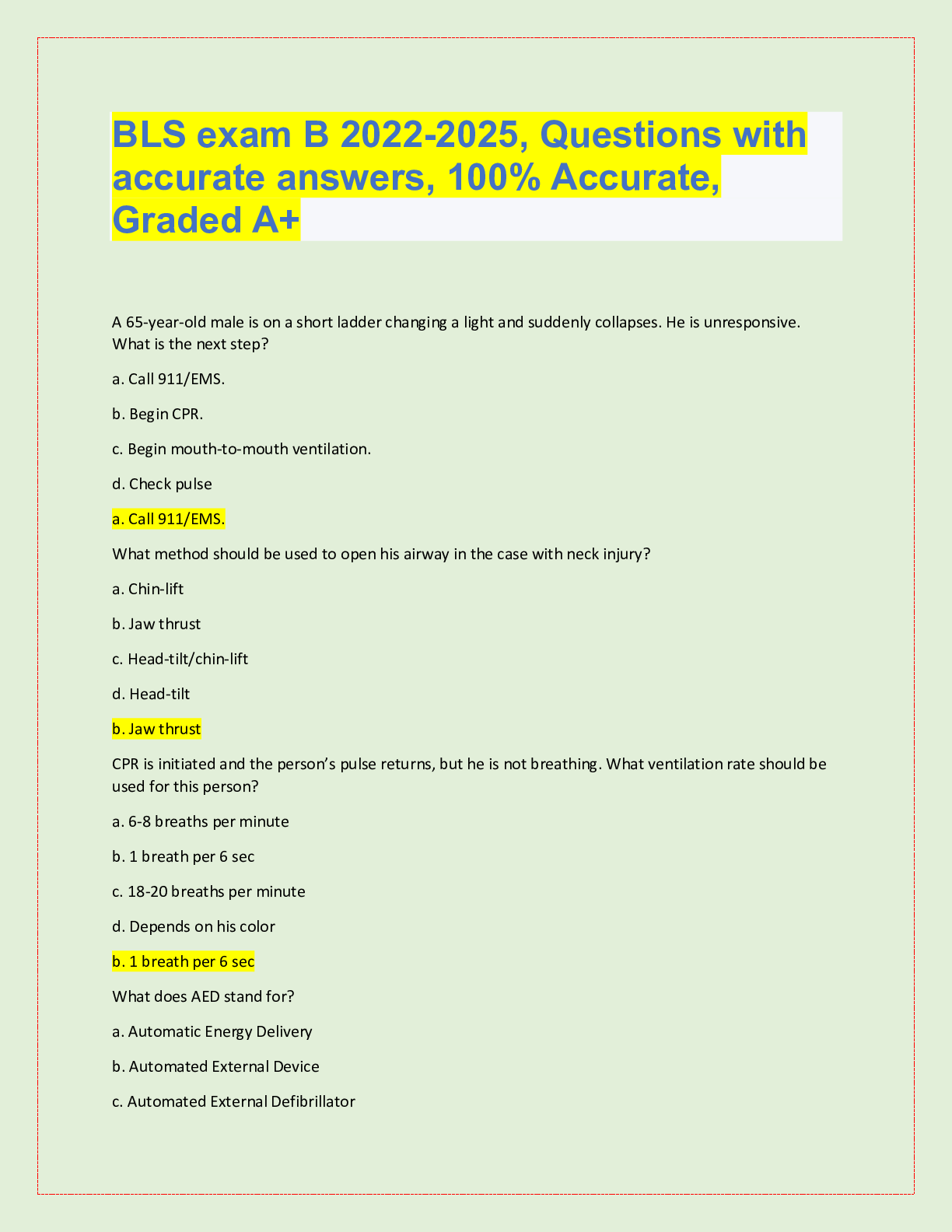











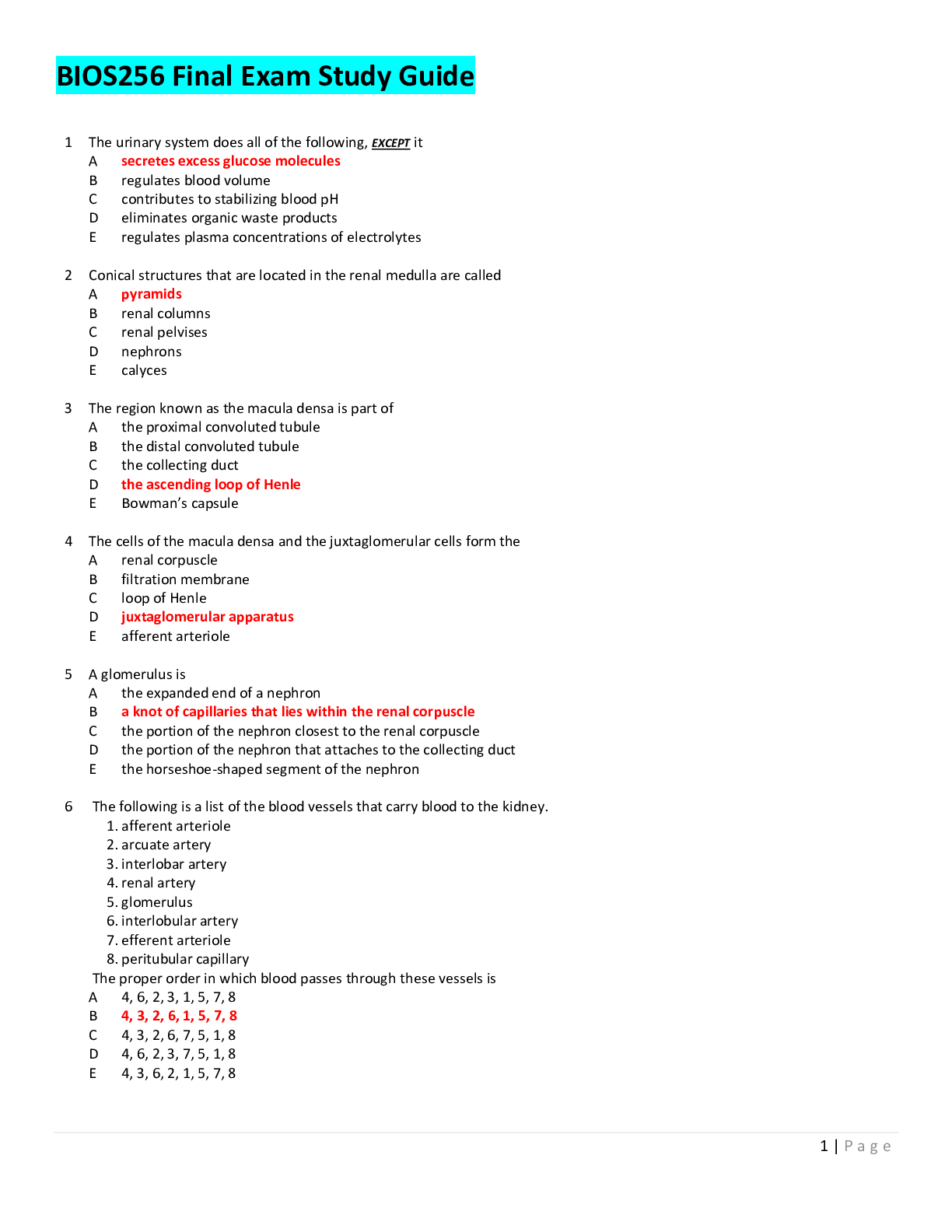


, Question Answers, 100% Correct , Correct Answers.png)
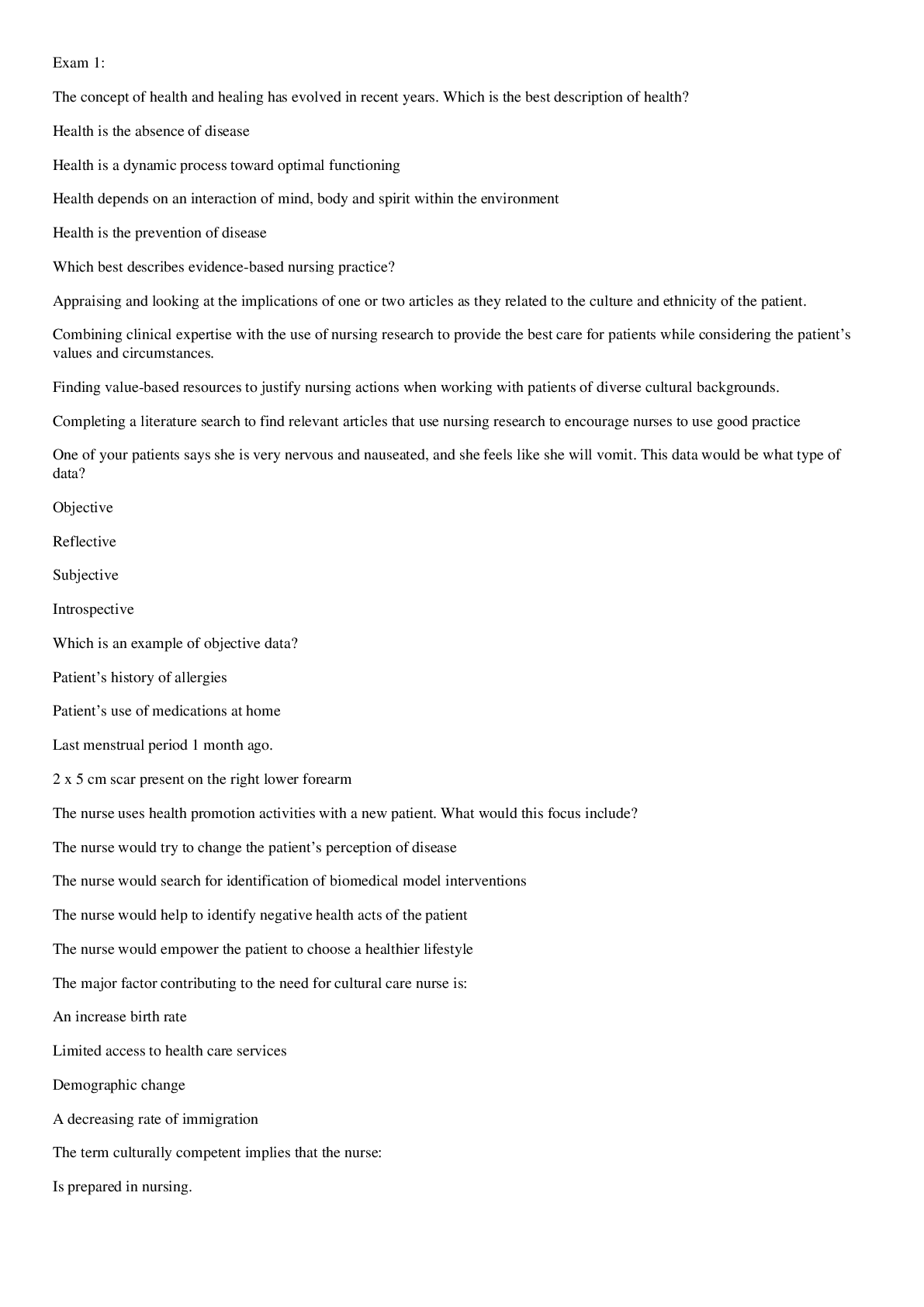
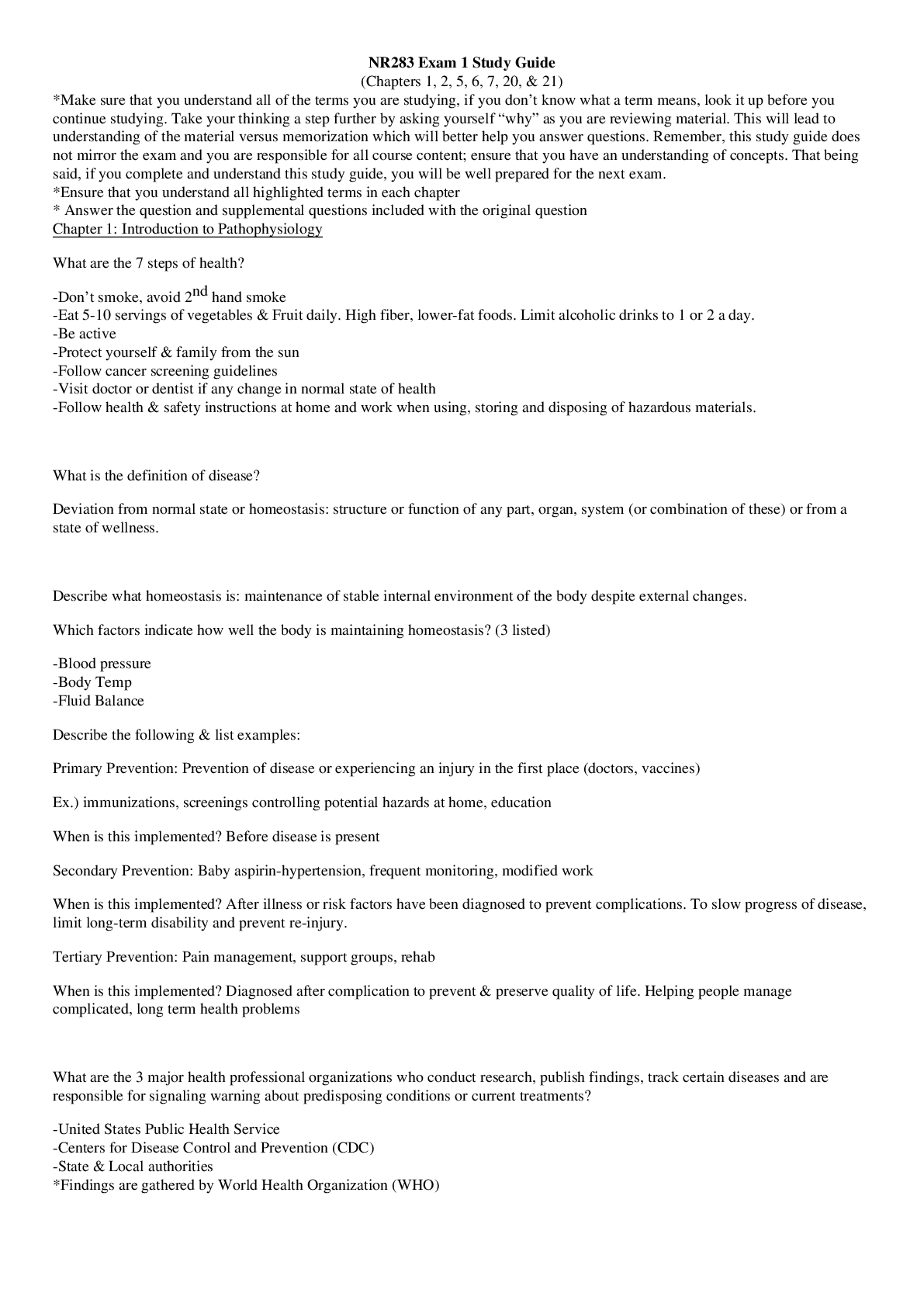




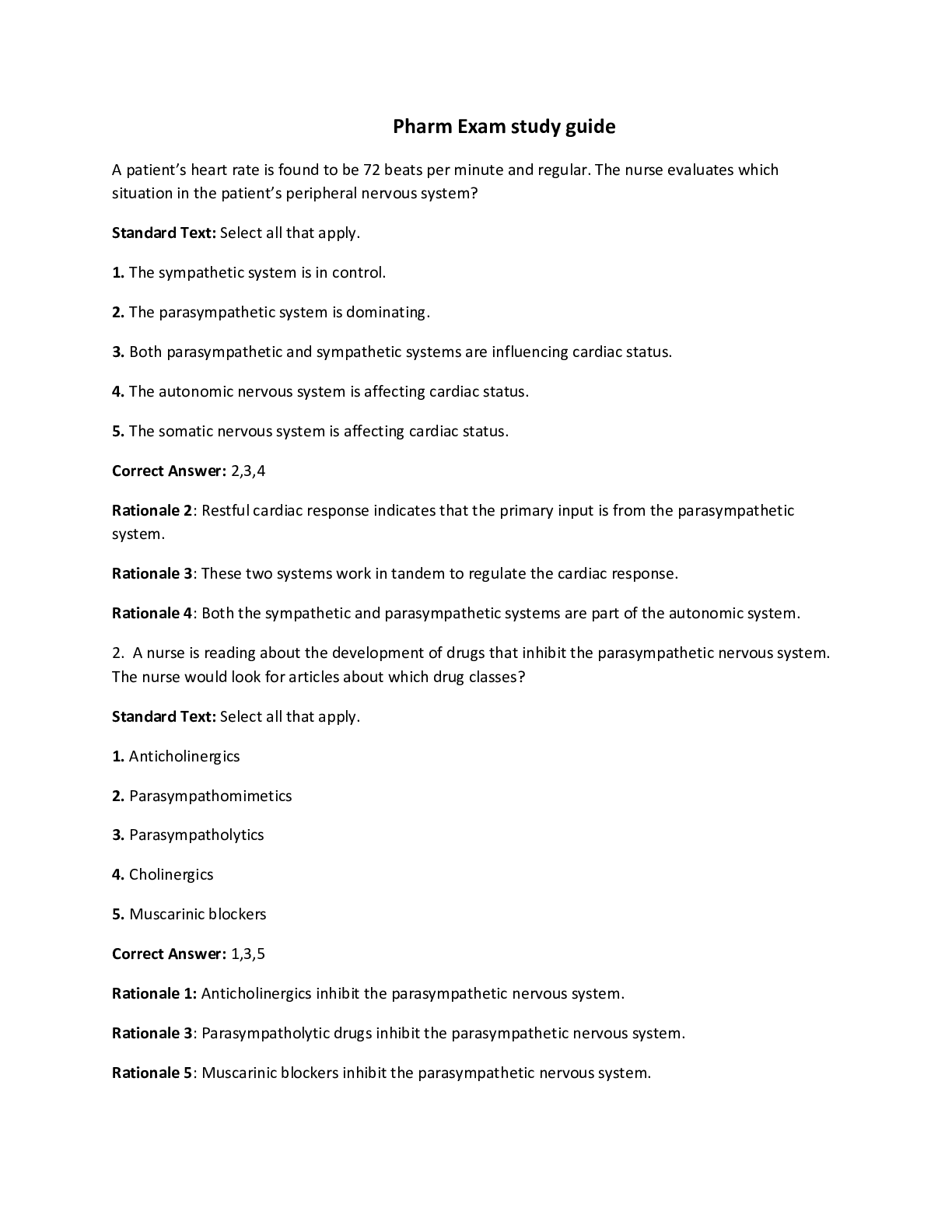
 Questions and Answers (latest Update), All Correct, Download to Score A.png)

